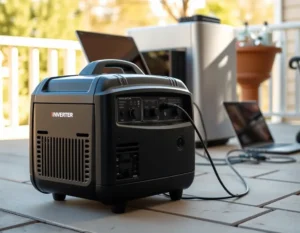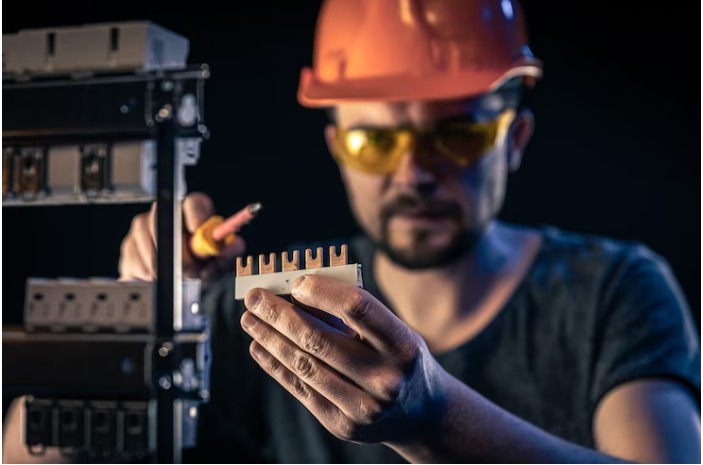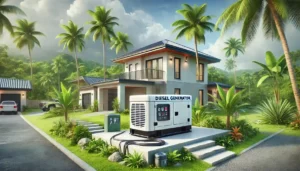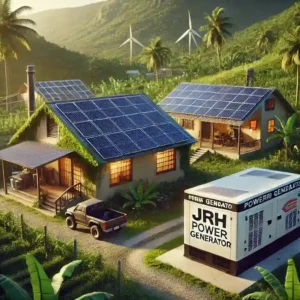
En el mundo moderno, donde la electricidad es fundamental para nuestras actividades diarias, las interrupciones eléctricas son un gran inconveniente, pueden afectar nuestra productividad y
Si alguna vez has estado en una situación en la que necesites una fuente de energía portátil, probablemente has escuchado o leído algo acerca de las baterías de generador eléctrico.
Estos dispositivos se han vuelto cada vez más populares debido a su capacidad para proporcionar energía confiable y conveniente en situaciones de emergencia o cuando no hay acceso a una toma de corriente.
En este artículo, explicaremos en detalle qué es una batería generador eléctrico, cómo funciona, sus beneficios, usos, características y algunas preguntas frecuentes sobre este innovador producto.
Una batería de generador eléctrico es un dispositivo portátil que almacena energía eléctrica en su interior y la libera cuando se necesita. Funciona como una batería recargable que se carga mediante una fuente de energía externa, como una toma de corriente o paneles solares, y luego se puede utilizar para alimentar diferentes dispositivos eléctricos.
La batería de un generador eléctrico suele estar equipada con salidas de corriente alterna (AC), corriente continua (DC) y puertos USB, lo que la hace versátil y compatible con una amplia gama de dispositivos, como smartphones, tablets, laptops, luces, electrodomésticos pequeños y herramientas eléctricas.
Una batería generador eléctrico funciona mediante una reacción química que convierte la energía eléctrica en energía química y viceversa.
Cuando la batería está siendo cargada, se aplica una corriente eléctrica a través de los electrodos de la batería, lo que produce una reacción química que almacena la energía en forma de energía química en los materiales de los electrodos. Cuando la batería está siendo descargada, la reacción química se invierte, liberando la energía almacenada en forma de energía eléctrica.
Existen varios tipos de baterías utilizadas en generadores eléctricos, cada una con sus propias características y aplicaciones. Algunos de los tipos más comunes son:
Las baterías de plomo-ácido son las más utilizadas en generadores eléctricos debido a su bajo costo y confiabilidad. Son ideales para aplicaciones de respaldo de energía y se utilizan en la mayoría de los generadores portátiles.
Sin embargo, tienen una vida útil limitada y requieren un mantenimiento regular, como la verificación del nivel de electrolito y la limpieza de los bornes.
Las baterías de iones de litio son una opción más avanzada y costosa para generadores eléctricos. Son conocidas por su alta densidad de energía, lo que significa que pueden almacenar más energía en un tamaño más compacto en comparación con las baterías de plomo-ácido.
Son livianas, no requieren mantenimiento y tienen una vida útil más larga. Son ideales para aplicaciones donde se necesita una mayor capacidad de almacenamiento de energía y se busca una mayor durabilidad.
Las baterías de níquel-cadmio son una opción menos común para generadores eléctricos debido a su costo y a las preocupaciones ambientales relacionadas con el cadmio. Sin embargo, son conocidas por su alta vida útil, resistencia a temperaturas extremas y capacidad de carga rápida. Son utilizadas en aplicaciones industriales y militares donde se requiere una alta fiabilidad y durabilidad.
Estas baterías utilizan una tecnología de electrolito en gel, lo que las hace libres de mantenimiento. No necesitan comprobación o ajuste del nivel de electrolito y son menos propensas a fugas o derrames.
Además, las baterías de gel son resistentes a las vibraciones y pueden funcionar en diferentes posiciones, lo que las hace adecuadas para aplicaciones de generadores eléctricos diesel en entornos más exigentes.
Estas baterías utilizan una tecnología de fibra de vidrio absorbente para retener el electrolito, lo que las hace libres de mantenimiento y menos propensas a fugas o derrames. Las baterías de AGM son conocidas por su alta tasa de descarga, lo que las hace ideales para aplicaciones de generadores eléctricos diesel que requieren una alta corriente de arranque y descarga rápida.
Estas baterías son similares a las baterías de NiCd en términos de durabilidad y tolerancia a temperaturas extremas, pero no contienen cadmio, lo que las hace una opción más ecológica. Sin embargo, las baterías de NiMH también tienen una densidad de energía relativamente baja en comparación con otras tecnologías más modernas, como las baterías de litio.
Estas baterías son una opción menos común y se utilizan principalmente en aplicaciones especializadas. Son conocidas por su alta capacidad y larga vida útil, pero también son más caras y tienen restricciones ambientales debido a su contenido de carbono, que es un material sensible al medio ambiente.

Las baterías de un generador eléctrico vienen en una variedad de tamaños, capacidades y características, lo que las hace versátiles y adaptables a diferentes necesidades. Algunas de las características más comunes de una batería generador eléctrico incluyen:
Capacidad de almacenamiento: Se refiere a la cantidad de energía que puede almacenar en su interior. Las capacidades varían desde pequeñas baterías de bolsillo con capacidad de mAh (miliamperios-hora) hasta baterías más grandes con capacidad de varios kilovatios-hora (kWh), que son ideales para alimentar dispositivos de mayor consumo de energía.
Salidas de corriente: Las baterías generador eléctrico suelen estar equipadas con salidas de corriente alterna (AC), corriente continua (DC) y puertos USB, lo que las hace compatibles con una amplia gama de dispositivos electrónicos. Algunas baterías también pueden tener salidas específicas para dispositivos como laptops, cámaras o electrodomésticos, lo que las hace más versátiles y convenientes.
Pantalla y controles: Algunas baterías generador eléctrico vienen con pantallas y controles integrados que permiten verificar el estado de carga de la batería, el nivel de energía consumido y otras configuraciones. Esto facilita el monitoreo y control del uso de la batería, lo que te permite administrar eficientemente la energía disponible.
Durabilidad y resistencia: Las baterías generador eléctrico suelen ser diseñadas para ser duraderas y resistentes a condiciones adversas, como golpes, caídas, polvo, agua y temperaturas extremas. Esto las hace ideales para su uso en actividades al aire libre, construcción y otras situaciones exigentes.
Portabilidad: Una de las ventajas de las baterías generador eléctrico es su portabilidad. Muchos modelos son compactos y livianos, lo que facilita su transporte y manejo. Algunas baterías incluso vienen con asas o correas para mayor comodidad al llevarlas contigo a donde vayas.
Al elegir una batería generador eléctrico, es importante tener en cuenta varios factores. Aquí hay algunas pautas a considerar:
Capacidad de almacenamiento de energía
Debe seleccionarse una batería que tenga suficiente capacidad para satisfacer las necesidades de energía de la aplicación específica. Esto dependerá del consumo de energía del generador eléctrico y de la duración del tiempo de respaldo necesario.
Tipo de batería
Como se mencionó anteriormente, existen varios tipos de baterías para generadores eléctricos, cada una con sus propias ventajas y desventajas. Es importante investigar y elegir el tipo de batería que mejor se adapte a las necesidades de la aplicación, considerando factores como la capacidad de almacenamiento de energía Mantenimiento y durabilidad
Portabilidad y versatilidad
Es importante seleccionar una batería generador eléctrico que sea fácil de transportar y que se adapte a las necesidades específicas de la aplicación. Algunas baterías son más ligeras y compactas, lo que las hace ideales para actividades al aire libre o situaciones donde se requiere movilidad, mientras que otras son más grandes y pesadas, pero ofrecen mayor capacidad de almacenamiento de energía.
Costo y presupuesto
Los diferentes tipos de baterías tienen diferentes costos, con las baterías de plomo-ácido siendo las más económicas y las baterías de iones de litio siendo las más costosas. Es importante evaluar el costo de la batería en relación con sus características y beneficios, así como considerar el presupuesto disponible para la adquisición de la batería.

En resumen, una batería de generador eléctrico es una opción versátil, conveniente y portátil para tener una fuente de energía confiable en diferentes situaciones. Ya sea que estés acampando, viajando, en una emergencia o en un lugar donde no haya acceso a la electricidad, una batería generador eléctrico puede ser una solución práctica y eficiente.
Cabe destacar que la tecnología de baterías está en constante evolución y pueden surgir nuevos tipos de baterías en el futuro con características mejoradas en términos de eficiencia energética, capacidad, durabilidad y sostenibilidad.
Si estás buscando una solución confiable y eficiente para tener energía eléctrica en cualquier momento y lugar, en JRH podemos ayudarte.
Ofrecemos una amplia variedad de generadores eléctricos de alta calidad, diseñados para cubrir desde las necesidades más básicas hasta las más exigentes,
Nuestro equipo de expertos se encarga de asesorarte para que encuentres el generador que mejor se adapte a tus necesidades y presupuesto.
¡¡¡No te quedes sin energía!!!

En el mundo moderno, donde la electricidad es fundamental para nuestras actividades diarias, las interrupciones eléctricas son un gran inconveniente, pueden afectar nuestra productividad y

Las turbinas eólicas se han convertido en el emblema de la energía renovable, ofreciendo una solución sostenible y limpia frente a los combustibles fósiles. Sin

Cuando se trata de mantener la energía en situaciones de emergencia, durante viajes de campamento o en eventos al aire libre, un generador de 3500

En tiempos de cortes de energía o desastres naturales, saber cómo usar un generador para alimentar una casa puede marcar la diferencia entre estar preparado

La búsqueda de energías alternativas se ha convertido en un pilar fundamental en la discusión sobre sostenibilidad y el futuro energético del planeta. Pero, ¿cuáles

En un mundo donde la demanda de energía eléctrica sigue en aumento, las interrupciones de servicio y el costo creciente de la electricidad han impulsado